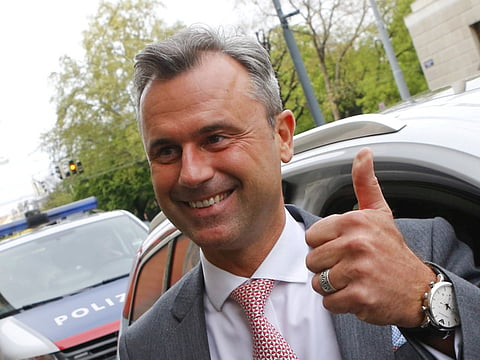It’s not game over. Austria stopped rightwing populism in its tracks
It was to be the last great domino of 2016, but the country showed that victory on the radical right is not inevitable

In 2016, the tide of right wing populism has seemed unstoppable. From Britain’s vote to leave the European Union (EU) after a referendum campaign soaked in foreigner-bashing, to US President-elect Donald Trump’s elevation to the White House. Britain’s Nigel Farage, France’s Marine Le Pen and the Netherlands’ Geert Wilders were rarely spotted without a smirk etched on their faces. The last great domino of 2016 was supposed to be Austria. A narrow defeat for the xenophobic right in the second round of the presidential elections in May was annulled, and the Freedom party’s Norbert Hofer looked set to become the first far-right Austrian-born head of state since the fall of Adolf Hitler.
“For those who think 2016 has been an awful year, and I for one am not one of them, I think it’s been rather good, well I’m sorry there’s a lot more bad news to come,” crowed Nigel Farage. Among his predictions was that Austria, too, would succumb to right wing populism: “A candidate will win the campaign committed for Austria to have a referendum of the membership of the union.”
Well, Farage, your boy got a beating. In fact, Hofer lost nearly 100,000 votes in six months; Green-backed candidate Alexander Van der Bellen, on the other hand, gained more than 200,000. Somewhat comically, Hofer partly blamed Farage for his loss, saying his intervention “didn’t help, it hindered us” and denounced it as a “crass misjudgement”. But in truth, it wasn’t Farage who caused Hofer’s defeat. It was the forces of hope organising in Austrian society. It was a “massive civil society mobilisation,” Maria Mayrhofer from activist organisation Aufstehn tells me. “In the repeated election it was all about mobilisation,” above all, encouraging “undecided or frustrated” people to vote. Van der Bellen pulled together a broad coalition, and a diverse range of NGOs, sport clubs and neighbourhood initiatives got involved.
Aufstehn distributed 50,000 political door hangers across the country: crucially, though they weren’t emblazoned with Van der Bellen’s name, but rather called for a “respectful togetherness, a tolerant and internationally renowned Austria”. The strategy was to make the campaign about values rather than a candidate, an approach that reached out to those who weren’t usually politically active. As Peter Kraus from the Austrian Greens tells me, the short answer to how the far right was defeated was: “We just organised.” The traditional establishment parties collapsed in the presidential election — a process, to varying degrees, that is being mirrored across Europe. Van der Bellen’s campaign had to offer a break from old-style politics. They might differ on certain issues, but they were united in wanting “to stop the far right and their threat to democracy and Europe”.
Kraus’s role was to involve prospective activists who registered online. “At the end of them we had more than 10,000 of them” in Vienna alone. He set up workshops to give them a basic understanding of campaigning. Crucially, it wasn’t a top-down campaign. Instead, it became decentralised. A phone bank in Vienna spoke to potential activists in rural Austria and gave them the material they needed to set up their own campaigns.
Across Europe, Austria’s far right manipulated fear and prejudice over the refugee crisis. But, as Kraus notes, Vienna — where most refugees are settled — voted overwhelmingly for Van der Bellen. Hofer, on the other hand, performed strongly in communities with no refugees. The very people living with those from other countries were least likely to succumb to the far right.
There is no room for complacency, of course. That 46 per cent of a western European nation voted for a far-right candidate is chastening. In the Austrian parliamentary elections to come, the far right can expect to do very well indeed, and perhaps be in a position to form a government. But in politics, momentum is precious indeed. Austria interrupted the march of right wing populism. The country showed that the victory of the radical right is not inevitable: if further defeats happen next year in France, the Netherlands and Germany, that will be a blow to the ambitions of Russian President Vladimir Putin and Trump. Our future does not belong to the Trumps, the Farages or the Le Pens. Hatred can be defeated. After the traumas of 2016, Austria shows us how.
— Guardian News & Media Ltd
— Owen Jones is a columnist and the author of Chavs: The Demonisation of the Working Class and The Establishment — And How They Get Away With It.



